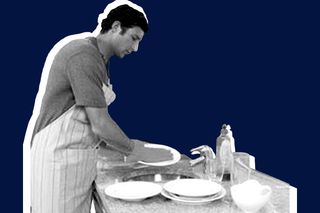
How a Bengaluru College Course Is Teaching Men to Be Equal Partners
Gendered education done right.

Earlier this month, rumor had it that IIT-BHU was set to introduce a course for women on how to become ideal wives by teaching them the self-confidence and interpersonal skills that would help them deal with new family members, as well as teaching them computer skills that would help in household managment.
But, before we could breathe a sigh of relief that it was a false rumor, Madhya Pradesh-based Barkatullah University proposed a similar three-month course in an effort to “empower women,” as per the university’s vice-chancellor, Prof DC Gupta.
And obviously, Twitter had a few opinions:
“This is outrageous! Do they also plan to have ‘adarsh pati’ courses? We need more of those.”
“It doesn’t seem to have a module on training husbands. Flawed course design.”
We’ve commented earlier about how society needs its social norms and attitudes (read: patriarchal) reconfigured, more than it needs Adarsh Bahu courses. Are our wishes now coming true?
Murali Mohan Kati, principal of Bengaluru-based Badaku Community College, is doing exactly this — promoting equality in relationships — by introducing a two-month course starting 22 September, called Reserved for Men. It will, he said, “provide young men the space to reflect on their lives as men and gain new perspectives.”
The course is aimed at teaching men the skills and values usually assigned to women: how to share, care, cook and emote. In other words, it will teach men to be equal partners in a relationship.
“Globally, the focus is now shifting towards sensitizing men. Masculinity is at the root of many problems in the social sphere, including trolls issuing rape threats on social media,” said Kati to The Hindu. “Masculine studies is taking a big leap in gender studies academically as well. We are trying to help a set of men reflect on their lives.”
The course is also said to involve psychologists and relationship counselors who will teach the male students, aged 21 to 40, how better to express their feelings; at least two of the sessions will also involve the men’s female family members to help them apply what they’ve learned in a neutral setting.
It may be a self-selecting group — men already interested in an equal relationship with their partners are the most likely to sign up.
“I often see myself as helping my wife,” when doing dishes, said Vineeth R., who has enrolled in the course, to The Hindu. “That’s wrong. Doing the dishes is my responsibility as well. But the conditioning is too hard. I hope I gain a clearer perspective on this through the course.”
If that shift in perspective happens, the course has done its work, Kati said. The whole point is to get men “questioning themselves and their role even in small everyday tasks,” he said.
That somebody realizes the responsibility of keeping a family and home running smoothly is not only a woman’s job is a pleasant change.
But more than that, the recognition that men must change, too, in order for gender equality to progress, is a giant step forward. Too often, efforts to empower women have focused solely on helping women to be more ‘masculine’ — assertive, tough, less emotional, career-focused — while still carrying the burden of housework, emotional support, childcare and other, stereotypically feminine, duties. The idea that men could benefit by learning traditionally feminine skills is revolutionary — and exactly what is needed to even the playing field at home and in the workplace.
It’ll be a wait-and-watch to see if courses like this pay off and contribute to more equal relationships; changing hearts and minds takes time — longer than the eight weeks of the course, certainly. But on the surface, at least, it sure seems like the college has gotten gendered education — and equality — right.
Anubhuti Matta is an associate editor with The Swaddle. When not at work, she's busy pursuing kathak, reading books on and by women in the Middle East or making dresses out of Indian prints.
Related


Humans Are Wired to Forgive — Which Can Be a Problem
